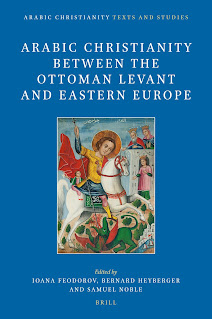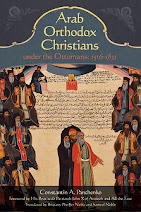Arabic original here.
Meditations on Death and the Resurrection
There is an inevitable truth that death lies in wait for us at some moment of our life. So how must one deal with this eventuality? Do we surrender to it and live our life in fear of it happening sooner or later? Or should we face it with courage and live as though it could happen at any moment? Do we live this coming death in constant fear or do we regard it as something natural and go about our daily life in a normal manner?
Kallistos Ware begins his article "'Go Joyfully:' The Mystery of Death and the Resurrection", which appears in his book The Inner Kingdom as follows: "In the worship of the Russian Orthodox Church, while the prayers of preparation are being said before the start of the Eucharist, the doors in the center of the icon screen remain closed. Then comes the time for the Divine Liturgy itself to begin: the doors are opened, the sanctuary stands revealed, and the celebrant sings the initial blessing. It was precisely this moment that the religious philosopher Prince Evgeny Trubetskoy recalled as he lay dying. These were his last words: 'The royal doors are opening! The Great Liturgy is about to begin.' For him death was not the closing but the opening of the door, not an end but a beginning. Like the early Christians, he saw his death-day as his birthday."
These words remind us of what Simeon the Elder proclaimed when he held the child Jesus during His presentation in the temple. He said, "Now let your servant depart in peace, O Lord, according to Your word, for my eyes have seen Your salvation" (Luke 2:29-30). Simeon saw the Savior, the awaited Messiah, and so he lacked nothing in this world, so he asked God to release him from this world to the world of salvation. Evgeny Trubetskoy also saw that his departure from this world was a departure to participation in the Divine Liturgy, which is communion between the living and the dead. He saw that death is the true beginning of new life in the eternal presence of God.
In the same article, the author quotes Metropolitan Anthony Bloom, "Death is the touchstone of our attitude toward life. People who are afraid of death are afraid of life. It is impossible not to be afraid of life with all its complexity and dangers if one is afraid of death... It is only if we can face death, make sense of it, determine its place and our place in regard to it, that we will be able to live in a fearless way and to the fullness of our ability." But he is quick to warn us not to ignore the mysterious nature of death and so we must not treat death lightly. It is, of course, an inevitable reality, but at the same time it is the great unknown.
How does the resurrection relate to all of this? Kallistos Ware responds, "For Christians, the constantly-repeated pattern of death-resurrection within our own lives is given fuller meaning by the life, death and resurrection of our Savior Jesus Christ. Our own story is to be understood in light of His story-- that story which we celebrate annually during Holy Week... Christ's dying, in the words of the Liturgy of Saint Basil, is a 'life-creating death'... As we Orthodox affirm at the Paschal midnight service, in words attributed to St John Chrysostom, 'Let none fear death, for the death of the Savior has set us free. He has destroyed death by undergoing death... Christ is risen and life reigns in freedom. Christ is risen, and there is none left dead in the tomb.'"
What is our attitude? Let us pray with those who pray, asking God to answer this supplication: "Let the end of our life be peaceful, without sorrow or shame before the judgment-seat of Christ." This requires us to be prepared through living a life of constant repentance, that we may stand not with those who are disappointed, but with those who are saved.
Meditations on Death and the Resurrection
There is an inevitable truth that death lies in wait for us at some moment of our life. So how must one deal with this eventuality? Do we surrender to it and live our life in fear of it happening sooner or later? Or should we face it with courage and live as though it could happen at any moment? Do we live this coming death in constant fear or do we regard it as something natural and go about our daily life in a normal manner?
Kallistos Ware begins his article "'Go Joyfully:' The Mystery of Death and the Resurrection", which appears in his book The Inner Kingdom as follows: "In the worship of the Russian Orthodox Church, while the prayers of preparation are being said before the start of the Eucharist, the doors in the center of the icon screen remain closed. Then comes the time for the Divine Liturgy itself to begin: the doors are opened, the sanctuary stands revealed, and the celebrant sings the initial blessing. It was precisely this moment that the religious philosopher Prince Evgeny Trubetskoy recalled as he lay dying. These were his last words: 'The royal doors are opening! The Great Liturgy is about to begin.' For him death was not the closing but the opening of the door, not an end but a beginning. Like the early Christians, he saw his death-day as his birthday."
These words remind us of what Simeon the Elder proclaimed when he held the child Jesus during His presentation in the temple. He said, "Now let your servant depart in peace, O Lord, according to Your word, for my eyes have seen Your salvation" (Luke 2:29-30). Simeon saw the Savior, the awaited Messiah, and so he lacked nothing in this world, so he asked God to release him from this world to the world of salvation. Evgeny Trubetskoy also saw that his departure from this world was a departure to participation in the Divine Liturgy, which is communion between the living and the dead. He saw that death is the true beginning of new life in the eternal presence of God.
In the same article, the author quotes Metropolitan Anthony Bloom, "Death is the touchstone of our attitude toward life. People who are afraid of death are afraid of life. It is impossible not to be afraid of life with all its complexity and dangers if one is afraid of death... It is only if we can face death, make sense of it, determine its place and our place in regard to it, that we will be able to live in a fearless way and to the fullness of our ability." But he is quick to warn us not to ignore the mysterious nature of death and so we must not treat death lightly. It is, of course, an inevitable reality, but at the same time it is the great unknown.
How does the resurrection relate to all of this? Kallistos Ware responds, "For Christians, the constantly-repeated pattern of death-resurrection within our own lives is given fuller meaning by the life, death and resurrection of our Savior Jesus Christ. Our own story is to be understood in light of His story-- that story which we celebrate annually during Holy Week... Christ's dying, in the words of the Liturgy of Saint Basil, is a 'life-creating death'... As we Orthodox affirm at the Paschal midnight service, in words attributed to St John Chrysostom, 'Let none fear death, for the death of the Savior has set us free. He has destroyed death by undergoing death... Christ is risen and life reigns in freedom. Christ is risen, and there is none left dead in the tomb.'"
What is our attitude? Let us pray with those who pray, asking God to answer this supplication: "Let the end of our life be peaceful, without sorrow or shame before the judgment-seat of Christ." This requires us to be prepared through living a life of constant repentance, that we may stand not with those who are disappointed, but with those who are saved.







